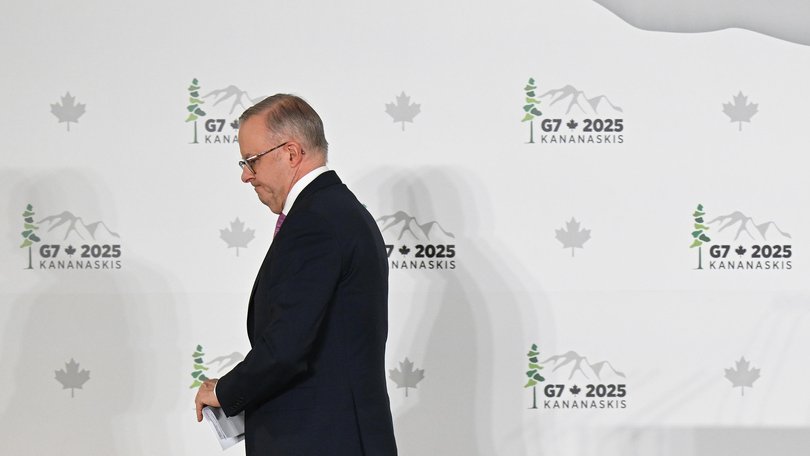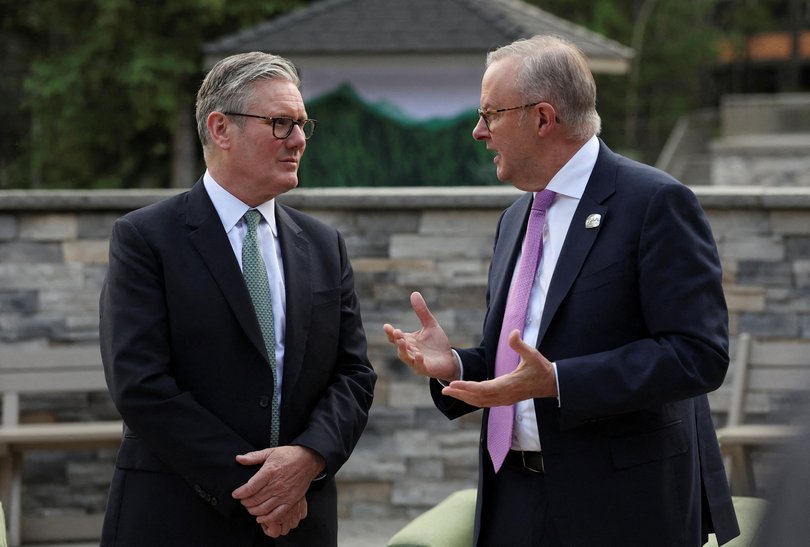G7 Summit: Will Anthony Albanese raise the stakes with a NATO Trump meeting after losing out in Canada
ELLEN RANSLEY Anthony Albanese staking a crucial first face-to-face meeting with Donald Trump on the sidelines of a major summit like G7 was always going to be risky.

Anthony Albanese staking a crucial first face-to-face meeting with Donald Trump on the sidelines of a major summit like G7 was always going to be risky. That the Prime Minister is now considering heading to the Netherlands next week for NATO if he can lock in a rescheduled meeting shows he believes it’s a gamble worth taking.
Before leaving the Canadian Rockies, Mr Albanese downplayed suggestions Mr Trump’s decision to head back to Washington early to deal with the escalating Israel-Iran conflict, subsequently nixing his bilateral meeting with the Australian Prime Minister, had been disappointing.
“We’re mature about the circumstances of what happened. It’s perfectly understandable. We’ll reschedule a meeting. From time to time, that is what occurs,” Mr Albanese said before departing Canada.
Sign up to The Nightly's newsletters.
Get the first look at the digital newspaper, curated daily stories and breaking headlines delivered to your inbox.
By continuing you agree to our Terms and Privacy Policy.In its place, the PM and Ambassador Kevin Rudd met with various US delegates, including Treasury Secretary Scott Bessent, Trade Representative Jamieson Greer and principle economic adviser Kevin Hassett to make Australia’s case for exemptions to the Administration’s 10 per cent tariffs on Australian steel and aluminium. He also tried to allay US fears about Australia’s news media bargaining code.
It’s not nothing, but everyone knows that Mr Trump is the ultimate decision-maker. And not only did the PM need to make the case on tariffs to the President in their highly anticipated meeting, but to try and secure some semblance of commitment to AUKUS, now the subject of a snap Pentagon review.
The three phone calls Mr Albanese and Mr Trump have shared since the US President’s victory aren’t insignificant, and Mr Rudd has worked hard in the background to shore up relationships with the Administration.
But with Australia still unfairly punished by the President’s tariffs, and the $368 billion AUKUS deal under a shadow of doubt, a face-to-face meeting is critical.
With that moment now postponed, Mr Albanese wanted to stress how much he understood why that meeting couldn’t go ahead, how the fact he found out via a tweet from the Press Secretary didn’t mean Australia wasn’t important to the President, nor did the fact Mr Trump hadn’t contacted him since - even though Mr Trump had a subsequent call with the Mexican Prime Minister, whose bilateral was also cancelled due to the early departure.
“I’m not driven by issues like that. I’m driven ... I understand that there’s important things happening. And that’s understandable at the moment. I’m mature about these things,” Mr Albanese said.
Mr Albanese had originally planned to send Deputy Prime Minister Richard Marles to the Netherlands next week to attend the NATO meeting for the second year in a row. That stands to change if a rescheduled meeting with Mr Trump can be locked in, with the PM telling travelling media he was now “considering” heading to The Netherlands.
“Look, I’m considering discussions with a range of people over the last couple of days … I met with the NATO secretary general yesterday,” he said.

Even if a meeting with Mr Trump is locked in and Mr Albanese does head to Europe, there’s still a risk of a G7 repeat given how dynamic and evolving the situation in the Middle East is. At this stage, President Trump is still scheduled to attend the two-day summit in The Netherlands, but the US state department has kept the door open to that all changing over the next six days.
“So I would say that anything is possible, but at this point in time that is still certainly on the books. But that’s going to be, obviously, to the – that’s a presidential trip; that’s going to be up to the White House, and I’m sure will be affected by their decision making based on what they see,” spokesperson Tammy Bruce said.
Even with that in mind, there is a strong argument for Mr Albanese to be in The Netherlands next week, where the Middle East and the ongoing war in Ukraine will be front of mind.
As Foreign Minister Penny Wong said on Wednesday afternoon, it would be a beneficial trip “in relation not only to President Trump, but more broadly we see the world in a dangerous point”.
“We see the importance of collective action, collective discussion and engagement with other countries of the world. So, obviously this is a decision for the Prime Minister, but I think he made clear to the Australian people this was a matter that he is considering carefully,” she told Sky News.
“(Given global volatility) these are the issues that are weighing on the Prime Minister’s mind. We all understand we face a very grave moment as a globe and we have to work together.”
The gravity of the perilous moment did weigh heavy on global leaders who gathered in Canada this week.
As an outreach partner, Australia didn’t have a seat at the big kid table, but Mr Albanese doesn’t want his trip to be derided as a failure, despite not securing that Trump meeting.
The current world order, upended thanks to Mr Trump’s unashamed isolationism and unpredictability, makes it more important than ever that Australia look to other trusted partners to deepen those relations.
The trilateral meeting with the European Commission President Ursula von der Leyen and the European Council President Antonio Costa, which culminated in an agreement to begin negotiating a defence and security pact, is a manifestation of that.
“We see this as an important framework for our current and future co-operation in areas like defence industry, cyber and counter-terrorism,” he said, adding that ministers would discuss the partnership in coming weeks and hoped to finalise it “pretty quickly”.
The stalled EU-Australia free trade agreement was also discussed, with Mr Albanese saying he was “hopeful” of finally reaching an agreement.
“I am hopeful that we’ll get a deal done,” he said.
It was one of seven bilateral meetings he held on the last day of the summit, including talks with the leaders of Germany, Japan, and the United Kingdom.
After his meeting with British Prime Minister Keir Starmer, where the pair discussed AUKUS, Mr Albanese said there was “nothing to suggest” any weakening in support for the alliance from the US despite the recent announcement of a review.
“It’s not up to me to speak on behalf of others - whether it is President Trump or Prime Minister Starmer. But Prime Minister Starmer, of course, has made public statements and the US Defence Secretary has made clear, clear statements as well,” he said.

